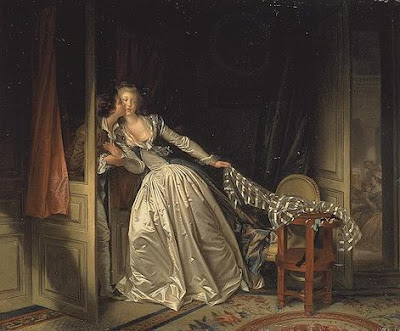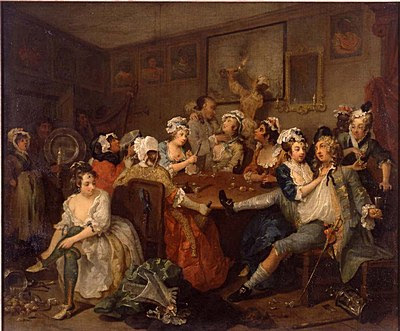We all have our tastes, our preferences, our prejudices. (I know I do.)
And one thing I’ve figured out: sometimes I have a preference (or, if you prefer, a prejudice) that has a clear reason for being — a motivation, if you  will — but I haven’t figured out what this reason is. (This leads to those “I really hate romances set on Greek Islands but I have no idea why” moments.) (You might also think it leads to those “I can’t understand why you enjoy sugar in your tea” moments, but that’s quite a different thing. I need no subtle motivation to know that sugar in tea is just a sad, sad thing.)
will — but I haven’t figured out what this reason is. (This leads to those “I really hate romances set on Greek Islands but I have no idea why” moments.) (You might also think it leads to those “I can’t understand why you enjoy sugar in your tea” moments, but that’s quite a different thing. I need no subtle motivation to know that sugar in tea is just a sad, sad thing.)
Why is this on my mind? Because I’ve just reasoned out the reason for one of my prejudices preferences.
And this makes me happy. Any sign that even the smallest part of my brain (or, indeed, any part of the world) is organized by something approaching logic makes me feel warm and snug and smug.
Now, I have mentioned that one might prefer to call this preference of mine a prejudice, right??? And I have made it clear that this is just my taste, my bias, one of my likes and dislikes??? (And I do have lots and lots of dislikes, particularly concerning vegetables and blue eye shadow.)
Because I honestly mean no criticism of anyone’s books (even books I may have read). After all, my refusal to eat cauliflower in no way implies that I dislike, disparage, or disrespect the cauliflower on your plate! And I particularly don’t disapprove of you for eating it (or reading or writing it.)
So…here it is.
I realized quite a while ago that I get surprisingly annoyed at reading historicals in which there exists perfect birth control… You know, the book where the virgin aristocratic heiress has a naughty aunt who teaches her (or provides her with) a fool-proof way to fool around with some hunky fool for as many months as she wants, with zero chance of pregnancy.
Now, it’s not like I always insist on perfect historical authenticity or total realism…after all, I’m a big fan of Shakespeare and Georgette Heyer. (Yes, I know that when Viola and Rosalind and Leonie dressed up as men they would still have looked like girls…but I just don’t care!)
So…why this great irritation on my part? Why does the better-than-the-year-2008 contraception in 1808 in just get under my skin? Well, I finally figured it out.
 The way I see it, a huge amount of the psychology, sociology, laws, economics, and fashion involving middle and upper-class women in 1808 Britain was based on the fact that reliable contraception did not exist.
The way I see it, a huge amount of the psychology, sociology, laws, economics, and fashion involving middle and upper-class women in 1808 Britain was based on the fact that reliable contraception did not exist.
After all, think how much the invention of the pill affected social norms and behavior involving everything from cohabitation to premarital sex to middle-class wives working outside the home to romance novels to adoption.
So, for me, reading a historical with foolproof contraception is as bizarre as reading some of the science fiction written in the 1950’s — the kind where the fifty-year-old workaholic hero’s wife has all her housework, shopping and entertaining done by robots, but she still doesn’t have a job or even a hobby. (I’m sorry, but what does she do all day???)
So there you have it. When it comes to reading about perfect contraception in 1808 (or mindless housewives in 2828)…I simply would prefer not to.
Cara
Cara King, who once wrote an essay arguing Bartleby the Scrivener was a ghost

What’s wrong with sugar in tea? Next you’ll be saying you’re against ketchup on scrambled eggs.
Todd-who-thinks-honey-is-also-nice
Cara, I feel the exact same way about heroines in contemporary romances not using birth control and ending up pregnant after spending one night with the hero. Even virgins nowadays now enough to insist on a condom. With all the new and various strains of STD’s around, I just can’t wrap my mind around a hero and heroine who are that irresponsible. Now if the condom breaks or the diaphram slips that’s one thing.
Thank you, Cara, for saying what I have been thinking for a while now. The entire moral take on birth control was different in 1808 and this kind of information was not something upper class women thought about with any regularity. And the methods that crop up in these novels just stretch the imagination too much. NOTHING was fool proof until the pill came along and even that isn’t 100% full proof.
Oh, this is one of my pet peeves..er..prejudices…er preferences, too, Cara.
The trend for sexier historicals almost demands that heroines ‘do the deed’ but for them not to even think about possible pregnancy boggles my mind. My preference is to have the hero and heroine always think about the possibility of a pregnancy.
I’m a little more forgiving on the birth control part, because I suspect some women thought it was more successful than it was, but, to me, the possibility of pregnancy must loom over any such romantic encounter set before 1965.
“in contemporary romances not using birth control and ending up pregnant after spending one night with the hero.”
I think this is why I never much liked “secret baby” stories–I always wondered what cave they were living in. 🙂
I agree with Diane that the idea of possible pregnancy must play a part in historicals, or the characters seem just as clueless as the contemp secret baby couples.
I remember reading a Patricia Gallagher novel called Castles in the Air in the 80’s that was set in mid-19th Century America, and the heroine used a sponge, because she’d been taught by the hero that was a way for them to prevent her getting pregnant (FYI, the hero was married, you’d never get away with that now. I thought that was so risque but interesting that it was even addressed.
It would be amusing to have a regency lady who does one of these herbal/sponge/whatever remedies and finds herself pregnant anyway. More realistic, too.
Interesting post, Cara. I also have a problem with the depiction of reliable contraception. From what I’ve read it was clearly not reliable though it could be somewhat effective.
As to whether characters use some form of birth control or not–and whether they trust it due to naivete or knowingly accept some risk–it’s up to the author to sell it to me in a way that makes sense for the historical background.
The thing is, we don’t know for certain whether some upper class ladies did or not. In The Grand Century of the Lady, Arthur Calder Marshall wrote that contraception was common among all classes in France by the 18th century but frowned on in England for moral reasons, even within marriage. But he still thinks some did it. “How many Georgian ladies soaked sponges in brandy or encouraged their husbands, or lovers, to engage in armour we have not the slightest idea. But the fact that the size of some families tended to decline towards the end of the 18th and during the early years of the 19th centuries makes one suspect that the upper and middle classes were beginning to exercise, not sexual, but reproductive restraint.”
There’s little written evidence on the subject but Calder-Marshall suspects it’s because “the lady of quality would have considered enthusiasm for birth control even worse taste than religious enthusiasm.”
There were also plenty of huge families and also women who had to take a trip to the Continent to bear an illegitimate child. So use of birth control either wasn’t that widespread or perhaps whatever they used failed.
It also doesn’t follow that unmarried virgins would make the same choices as those who were married or widowed. The stakes were higher for them–that’s something I don’t like to see overlooked in romances although of course not all our heroines have to be unmarried virgins anymore.
I’m sure there was a broad range of human behavior back then as now and since it’s not the sort of thing people wrote about much I think there’s some leeway for individual characters and situations. I still like to see things portrayed within the context of the times.
Oh and I take sugar in my tea but honey is even better. Please don’t despise me, Cara! 🙂
Well, I’m someone who that doesn’t matter with. . . but I rather figure it’s showing up more, the idea of the birth control, because of the modern people reading it. I almost expect to hear that high ups (editors, maybe?) saying to add more of it in because we want to give the message to modern women. And I say that because I’ve noticed more mentions of whatever types of birth control in Regencies. But then, it could be just a plot device, like today we see people forgetting it or it failing.
Me, I’m fine without it all. . . I mean, I’m fine with a world that plenty of the couples in books having sex and babies don’t show up unless really needed. Totally alright with that! 🙂
Lois
I have to confess that I like sugar in tea. I also admire Bartleby. There have been so many times I’ve wanted to tell people “I would prefer not to” and get away with it like he does.
Well, I’m delighted to know I’m not alone!
There have been so many times I’ve wanted to tell people “I would prefer not to” and get away with it like he does.
Georgie, you’re a woman after my own heart!
And Elena, you misunderstood. I don’t despise you for putting sugar in your tea, I despise the sugar itself. ;-P
Just kidding.
And BTW, I’m not against historicals in which the characters do know a little something about contraception…it’s really the foolproof bit that gets my goat. If it goes beyond “once or twice we were carried away by passion” into a regular occurrence, I’d prefer the hero and heroine (separately or together) to spend a little time thinking up a contingency plan… (And the time-tested “if you get pregnant, of course, I’ll marry you” has the benefit of surely having been said millions of times…) 🙂
Cara
Y’all have to bring up such a fascinating topic when I’m stuck in an all-day computer class with limited web-surfing time, don’t you?
I prefer characters who consider the possibility of pregnancy, and I always write ones who do so–though sometimes they get carried away by passion just that one time and don’t think about it till it’s too late! And I have to confess, I did once use the old device of “heroine thinks she’s barren but it turns out that her Evil First Husband was actually shooting blanks.” But I made my heroine’s assumption that she was the one with the problem a little more logical by giving the Evil First Husband a bastard by his mistress. I never got a chance to fit in the reveal that the mistress was cheating on him, but I hoped readers could figure out that part on their own.
Cara, I disagree about the sugar/tea issue, but I agree about contraception. Heck, any person thinks about it, no matter how convenient the protection is to get. Like Diane and others, I like the characters to at least think about the possibility and anticipate the consequences.
Okay, it totally depends on the kind of tea!
Black tea with sugar? Shudder.
Orange spice herbal, or green tea with a squeeze from the honey bear (plastic kind)? Yummy.
Also, a huge congrats to Janet and the Rules of Gentility for winning the Holt medallion!
Yay Janet! I have said repeatedly, I love that book!
Sorry, but I learned to drink tea from my British neighbors. I have both sugar and milk in it. In Earl Gray, to say the least. Do I get drummed out of the ranks for that?
Me, too, doglady. My English Auntie always prepared the milk and sugar and then added her tea. I prefer a spot of honey and a splash of milk.
As to the other… it drives me crazy!! My sister has always said that the only woman safe from getting pregnant is a dead one. I know a number of woman who were on the pill and ended up pregnant. Someone I know had a friend who’d had her uterus removed and got pregnant and carried the baby in her abdomen. (The child was healthy by the way.) I know of vasectomies that have failed as well as tied tubes, and full intercourse does not have to occur. It drives me crazy when pregnancy is not considered a possibility, not to mention the STDs, which are not new to this century. But, there are plenty of people today who think that using contraception is foolproof. Perhaps the people at that time believed their methods were just as foolproof. “It won’t happen to me.” “That only happens to other people; I’m smarter than that.” And so the excuses go on. The more things change the more they remain the same.
Perhaps the real frustration is that there ARE people who believe this type of story true. Now THAT is a scary thought.
Susan, that device totally works for me (well, I’ve been known to use it!) especially since at that time they didn’t know men could shoot blanks. As long as the husband could shoot *something* they assumed any fertility issues were caused by an imbalance in the woman’s constitution.
Susan, I used that in The Vanishing Viscountess. The heroine did not think she could have babies, so she and the hero could cohabitate all they wanted on their road trip.
I figured that doctors did not know all about reproductive health during the Regency, and that they would make mistakes as a result.
In the Lindsey Davis mysteries set in Ancient Rome the hero and heroine use a form of contraception which they at least believe to be effective. Not sure how many of the details she researched and how much she made up…of course, the hero and heroine do succeed in producing two kids (so far) in the course of the series. 🙂
Historically, the Roman upper classes did have surprisingly small families…but they also practiced abortion and exposing of infants, so they may not have had effective contraception at all.
The Russians put jam in their tea. Does that count?
Todd-who-draws-the-line-there
Elena and Diane, maybe the Sterile First Husband is just one of those plots every writer uses at least once. It’s just so convenient when you want a non-virginal heroine without children from a previous marriage to complicate the story!
Todd, at first I read your comment about the Russians putting jam in their tea as another traditional birth control method, and I was all, “What kind of jam? Was it herbal?”
Oh, Todd, you sent me straight back to childhood. My Lithuanian grandmother used to make us chamomile and put raspberry jam in it. Now I want some!
Also, a huge congrats to Janet and the Rules of Gentility for winning the Holt medallion!
Woohoo, Janet! 🙂
Congrats, Janet!
As to the sugar in tea thing — I suppose if the sugar really wants to hang out with the tea, I can avert my eyes…and choose not to read any subgenre of romance that promotes their unwed cohabitation (and codrunkenness!) I will refrain from writing vitriolic letters to the RWR complaining about how sugar has ruined the romance genre…
Cara
Congrats, Janet!
Susan Wilbanks wrote:
Todd, at first I read your comment about the Russians putting jam in their tea as another traditional birth control method, and I was all, “What kind of jam? Was it herbal?”
Jam in tea has strong contraceptive properties. For example, my wife wouldn’t dream of sleeping with a man who drank it.
Todd-who-guesses-that-counts